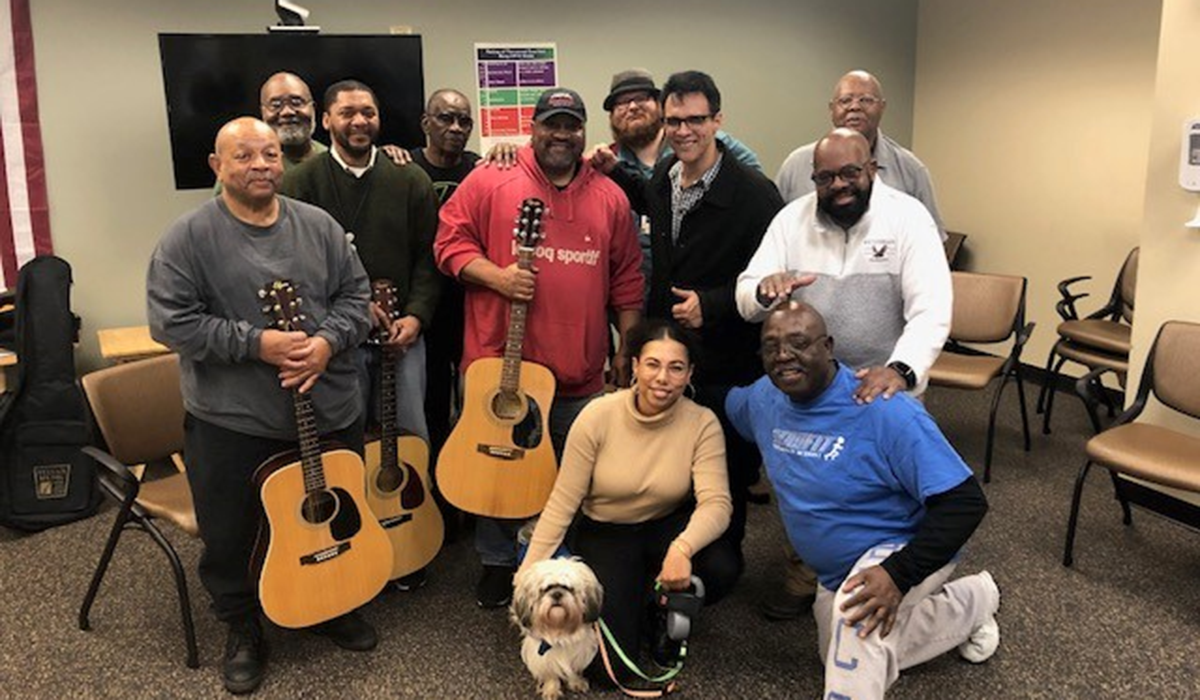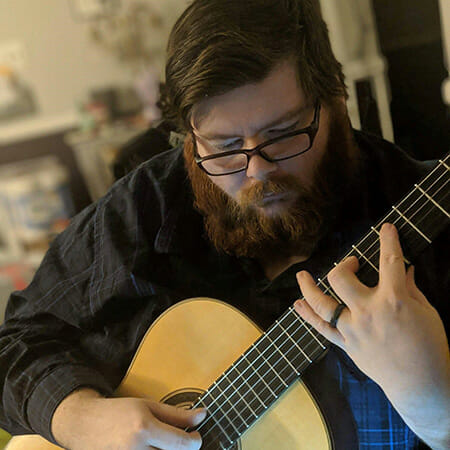Musician Serves Veterans Through Weekly Guitar Lessons

Meet Daily Point of Light Award honoree James Leitch. Read his story and nominate an outstanding volunteer or family as a Point of Light.
James Leitch has been a passionate guitar player for the past 25 years. When his own guitar teacher posted about a need for a music teacher for Loch Raven VA Outpatient Clinic’s music program for veterans, he thought this would be a great opportunity to use his passion for service.
Each Wednesday, James teaches guitar and music theory to a class of veterans. While the classes were initially at the clinic, which is in Baltimore, MD., the pandemic caused the instruction to go virtual. Loch Raven even provides guitars, replacement strings and other equipment to veterans who need help obtaining them.
Describe your volunteer role with teaching veterans at Loch Raven VA Outpatient Clinic.
I teach guitar. My role is that I provide them with instruction on how to play, give them diagrams and homework to help them progress, show them songs they would like to learn and give them a little bit of instruction in music theory so they understand what they’re doing.
What inspired you to start this?
I first got involved in January 2020. My guitar teacher at CCBC [Community College of Baltimore County] had been posting about his experience teaching a guitar class, and he had to move on because he had other obligations, so he asked if anybody was interested in taking over. I though it sounded like a great opportunity. I enjoy teaching and especially teaching guitar, and these are people who have a need that I can fulfill.

How do these music lessons help the veterans?
Music is therapeutic. Having something to distract you or to focus on can be really beneficial to people who have PTSD and other sorts of trauma related to war. I think it’s important for everybody to have an outlet for expression and something for their creative side. We don’t always get that. Guitar is safe because even though it’s hard, it’s a skill you can learn and the guitar does the work. People have a lot of problems learning to do things like sing or play some of the orchestral instruments and things like that, but when it comes to guitar, people have an impression that it’s a little more accessible.
Why is music something you would want to share in this way?
It’s a source of achievement. It’s a source of diversion. It’s a source of expression. It can help you to get feelings and thoughts and emotions out that you might not have another vehicle to get them out, and they need to get out.
What kind of feedback have you received from your students?
The students seem to be very happy. They’re coming along playing little tunes here and there, and it’s a really great feeling to see it click for somebody. They struggle with something a little bit for maybe a couple weeks, and then all of a sudden it just falls into place and makes sense and they are very excited. I try to be as supportive as I can. I get calls at weird random hours from some of my students sometimes saying, “Hey, I don’t know if I really understand this thing you want me to do,” and I like to help them with that. I think they really enjoy it.
What’s been the most rewarding part of your work?
Definitely meeting and hanging out with people and developing some friendships and relationships and camaraderie. Some people really take to the guitar and some people really struggle. They’re almost there for something else, and that camaraderie is really exceptional and I think it keeps people coming back.
Why do you think it’s important for others to give back?
It’s a rough world out there and we don’t all have what we need. Many of us have a surplus in one area that other people will benefit from if we share. I think that’s really important for people to do. When you have something you can give people, I think you should.
What do you want people to learn from your story?
Volunteering is great fun and it is work. It’s rewarding because you feel good about yourself, but more importantly you develop relationships with people. The relationships with people are what get you by, and are the most important things that we have, honestly. I think that’s what people should seek out. There’s a function to volunteering — people need this thing, you have the thing, bring them the thing, help them with the thing. But ultimately that’s just a vehicle for developing relationships, and developing those relationships is what’s crucial.
Do you want to make a difference in your community like James? Find local volunteer opportunities.
